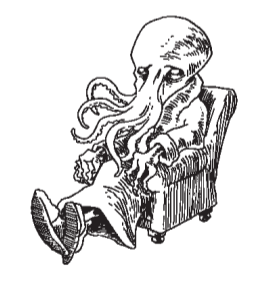“Perhaps one needs to have suffered a great deal in order to appreciate Lovecraft…”
—Jacques Bergier
Life is painful and disappointing. It is useless, therefore, to write new realistic novels. We generally know where we stand in relation to reality and don’t care to know any more. Humanity, such as it is, inspires only an attenuated curiosity in us. All those prodigiously refined “notations,” “situations,” anecdotes… all they do, once a book has been set aside, is reinforce the slight revulsion that is already adequately nourished by any one of our “real life” days.
Now, here is Howard Phillips Lovecraft: “I am so beastly tired of mankind and the world that nothing can interest me unless it contains a couple of murders on each page or deals with the horrors unnameable and unaccountable that leer down from the external universes.”
*
Howard Phillips Lovecraft (1890–1937). We need a supreme antidote against all forms of realism.
*
Those who love life do not read. Nor do they go to the movies, actually. No matter what might be said, access to the artistic universe is more or less entirely the preserve of those who are a little fed up with the world.
As for Lovecraft, he was more than a little fed up. In 1908, at the age of eighteen, he suffered what has been described as a “nervous breakdown” and plummeted into a lethargy that lasted about ten years. At the age when his old classmates were hurriedly turning their backs on childhood and diving into life as if into some marvelous, uncensored adventure, he cloistered himself at home, speaking only to his mother, refusing to get up all day, wandering about in a dressing gown all night.
What’s more, he wasn’t even writing.
What was he doing? Reading a little, maybe. We can’t even be sure of this. His biographers have in fact had to admit that they don’t know much at all and that based on appearances it would seem that at least between the ages of eighteen and twenty-three he did absolutely nothing.
*
Then gradually, between 1913 and 1918, very slowly, the situation improved. Gradually, he reestablished contact with the human race. It was not easy. In May 1918 he wrote to Alfred Galpin: “I am only about half alive—a large part of my strength is consumed in sitting up or walking. My nervous system is a shattered wreck and I am absolutely bored and listless save when I come upon something which peculiarly interests me.”
It is definitely pointless to embark on a dramatic or psychological reconstruction. Because Lovecraft is a lucid, intelligent and sincere man. A kind of lethargic terror descended...
You have reached your article limit
Sign up for a digital subscription and continue reading all new issues, plus our entire archives, for just $1.50/month.
Already a subscriber? Sign in





